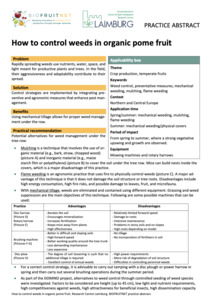{Tool} How to control weeds in organic pome fruit (BIOFRUITNET Practice Abstract). Creator(s): Mora Vargas, Alfredo and Kelderer, Markus. Issuing Organisation(s): Laimburg Research Centre. Biofruitnet Practice Abstract, no. 041. (2023)
|
PDF
- Published Version
- English
(How to control weeds in organic pome fruit)
628kB | |
|
PDF
- Published Version
- German/Deutsch
(Beikrautregulierung im Bio-Kernobstanbau)
630kB | |
|
PDF
- Published Version
- Italian/Italiano
(Come controllare le erbe infestanti nella produzione di pomacee biologiche)
591kB | |
![[thumbnail of Bildschirmfoto 2024-04-16 um 11.28.36.png]](/45940/7.hassmallThumbnailVersion/Bildschirmfoto%202024-04-16%20um%2011.28.36.png)  Preview |
Image (PNG)
- Cover Image
- English
340kB |
|
PDF
- Published Version
- Latvian/Lettish/Latviesu
762kB |
Document available online at: https://orgprints.org/45940
Summary in the original language of the document
Using mechanical tillage allows for proper weed management under the row.
Practical recommendation
Potential alternatives for weed management under the tree row:
• Mulching is a technique that involves the use of organic material (e.g., bark, straw, chopped wood) (picture A) and inorganic material (e.g., maize starch film or polyethylene) (picture B) to cover the soil under the tree row. Mice can build nests inside the covers, which is a major disadvantage of this practice.
• Flame weeding is an agronomic practice that uses fire to physically control weeds (picture C). A major advantage of this technique is that it does not damage the soil structure or tree roots. Disadvantages include high energy consumption, high fire risks, and possible damage to leaves, fruit, and microfauna.
• With mechanical tillage, weeds are eliminated and contained using different equipment. Grassing and weed suppression are the main objectives of this technique.
• For a correct control strategy, it is advisable to carry out tamping with a disc plough or power harrow in spring and then carry out several brushing operations during the summer period.
• As part of the DOMINO project, alternatives to weed control through controlled seeding of weed species were investigated. Factors to be considered are height (up to 45 cm), low light and nutrient requirements, high competitiveness against weeds, high attractiveness for beneficial insects, high dissemination capacity (stoloniferous plants) and persistence (perennial plants). Some examples of herbaceous plants that have fulfilled these factors in Northern Italy: Gallium mollugo, Trifolium repens, T. resupinatum, T. repens, Achillea millefolium.
| EPrint Type: | Practice tool |
|---|---|
| What problem does the tool address?: | Rapidly spreading weeds use nutrients, water, space, and light meant for productive plants and trees. In the field, their aggressiveness and adaptability contribute to their spread. |
| What solution does the tool offer?: | Control strategies are implemented by integrating preventive and agronomic measures that enhance pest management. |
| Country: | Italy |
| Type of Practice Tool: | Practice abstracts |
| Keywords: | Weed control, preventative measures, mechanical weeding, mulching, flame weeding |
| Agrovoc keywords: | Language Value URI English weed control http://aims.fao.org/aos/agrovoc/c_8345 English mechanical weed control http://aims.fao.org/aos/agrovoc/c_24200 English mulching http://aims.fao.org/aos/agrovoc/c_4978 |
| Subjects: | Crop husbandry > Production systems > Fruit and berries Crop husbandry > Weed management |
| Research affiliation: | European Union > Horizon 2020 > Biofruitnet Italy > Laimburg Research Centre for Agriculture and Forestry of BZ Province European Union > Organic Farm Knowledge |
| Horizon Europe or H2020 Grant Agreement Number: | 862850 |
| Related Links: | https://organic-farmknowledge.org/tool/45940, https://biofruitnet.eu |
| Project ID: | ofk |
| Deposited By: | Basler, Andreas |
| ID Code: | 45940 |
| Deposited On: | 25 Apr 2023 14:44 |
| Last Modified: | 02 May 2024 10:32 |
| Document Language: | English, German/Deutsch, Italian/Italiano |
| Status: | Published |
Repository Staff Only: item control page

 Download Statistics
Download Statistics Download Statistics
Download Statistics
